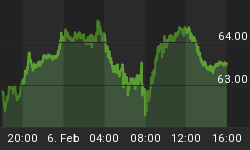The inflation redux plan from the Fed and Washington is based on zero interest rates, massive deficits and quantitative easing, which are designed to bring down the value of the U.S. dollar and create inflation. That is the truth, despite promises from Treasury Secretary Geithner that he really means it this time when he says the U.S. has a strong dollar policy--the irony being, that he says this while concurrently begging the Chinese to allow the dollar to fall vs. the Renminbi. But their hopes placed in a lower dollar are woefully misguided and all that is being accomplished is to put into place the same conditions that brought the global financial system to its knees.
Messrs Geithner and Bernanke have been successful in bringing down the value of our currency. In fact, many of the negative factors that were in place before the global economic meltdown occurred have returned in full force.
The trade deficit for September surged 18% to $36.5 billion. That gap was the largest since the beginning of 2009 and largely due to imports surging 5.8% to $168.4 billion, which was the biggest increase since 1993. The news must have been greeted with cheers in D.C. After all, the deficit would mean more dollar weakness and signaled the return of the borrowing and spending consumer. But the news also meant that the strategy of balancing trade by destroying the dollar was not based on sound economics. The U.S. dollar fell from 78.5 on the DXY to about 77 during the month of September. In fact, the US dollar has lost more than 16% of its value since March of this year. If a weak dollar discouraged imports and boosted exports, then why did imports surge by the most in 16 years?
Sorry Ben and Tim, the so called benefits of a falling dollar didn't materialize as planned. That's because the inflation you created to bring the dollar down caused the price of goods made in the US to become more expensive. Therefore, foreign exporters couldn't really afford to increase the purchase of American made goods even though their currencies strengthened.
The Treasury and the Fed have also able to bring risk appetites back to 2007 levels. The massive increase in money printing and government guarantees has reduced credit spreads to razor thin margins. The Libor OIS spread measures the spread between the London Interbank Offered Rate for dollars over three months and what traders expect the Fed's Funds target rate will be during the term of the contract. The gap fell to .1 percentage point this quarter and according to Bloomberg, it was below the average between December 2001 and July 2007. The record high Libor-OIS Spread was 3.64% in September of 2008.
Likewise, the Ted Spread is back to the "good old days" as well. Last November the gap between the 3 month Treasuries and 3 month LIBOR was 199 bps. Today it is just 21 bps. But the mispricing of risk that helped bring the financial sector down in 2007 and 2008 is not boosting bank lending to private industry. Bank lending is plummeting for the creation of capital goods and new businesses. However, Money of Zero Maturity is up 8% YOY. That's because banks are lending to the U. S. government, which is the only insatiable entity for borrowing that still exists.
So the benefits of a crumbling currency have yet to materialize. However, the ravages of pursuing such a flawed policy have started to arrive. The price of oil has soared and gold is setting new highs every day. Credit spreads are indicating that investors are mispricing risk yet again and the ballooning trade deficit indicates that we once again believe we can consume much more than we produce.
The stock market is dancing on top of a $2 trillion monetary base and that latent liquidity has sent commodities higher, while the dollar sinks. My guess is that Wall Street and Washington believes things are getting much better. But I've seen this movie already and I don't like how it ends. As the prints on CPI become more and more difficult to ignore, the Fed will be forced to remove the life support provided by their free money policy. When that occurs we will see the return of economic calamity. And maybe then we will have the courage to finally face and deal with the true problem. New flash to D.C. and Wall Street, it is not the misperception of an overvalued dollar, but rather it is our overriding debt.
Be sure to listen in on my Mid-Week Reality Check and to follow my blog Pentonomics
Follow me on Twitter: http://twitter.com/michaelpento















